Biden again declares he will “defend” Taiwan with U.S. forces, essentially threatening nuclear war against China. Why is he dropping “ambiguity” and raising the level of tension? Noam Chomsky and Daniel Ellsberg join Paul Jay on theAnalysis.news.
Paul Jay
Hi. Welcome to theAnalysis.news. I’m Paul Jay. In a few seconds, I’ll be back with Noam Chomsky and Daniel Ellsberg. Please don’t forget there’s a donate button, subscribe button, an email list, and all the buttons.
Noam Chomsky and Daniel Ellsberg join me today to discuss President [Joe] Biden’s again claiming the U.S. will defend Taiwan with U.S. Troops if China uses military force to reunify the country. Here’s what Biden said on 60 Minutes.
Scott Pelley
What should Chinese President Xi [Jinping] know about your commitment to Taiwan?
Pres. Joe Biden
We agree with what we signed onto a long time ago. There’s a One China policy, and that Taiwan makes its own judgments about its independence. We are not moving. We’re not encouraging it being independent. We’re not. That is its decision.
Scott Pelley
But would U.S. forces defend the island?
Pres. Joe Biden
Yes. If, in fact, there was an unprecedented attack.
Scott Pelley
To be clear, Sir, U.S. forces, U.S. men and women, would defend Taiwan in the event of a Chinese invasion?
Pres. Joe Biden
Yes.
Paul Jay
Analysts in the U.S. and elsewhere, including Chinese, are saying this sounds like the end of strategic ambiguity over Taiwan. It also seems that, once again, the White House has tried to walk it back a little bit, claiming the One China policy is still in effect. How there’s a One China policy and a commitment to use American soldiers to defend Taiwan seems to escape me now.
Joining me again is Noam Chomsky and Daniel Ellsberg. Thanks very much for joining me. Noam, why don’t you start with this? What is going on with Biden doing this? Are they really serious about dropping strategic ambiguity? Maybe you can explain a little bit about what that is to people that don’t know.
Noam Chomsky
What’s held for about 50 years, keeping peace in a very volatile area, we should recognize that under international law, Taiwan is part of China. It’s not ambiguous. It’s like Hawaii being part of the United States. The United States accepted about 50 years ago the One China policy that says Taiwan is part of China. Still, we’ll keep ambiguous about what’s going to happen in the interaction between Taiwan, China, and the United States. Both sides won’t do anything to disrupt it. We just won’t talk about it. We won’t be provocative. We won’t try to disrupt it. Let’s just keep the peace in a very volatile area. It’s worked for 50 years. That’s pretty good.
Now the United States is trying to provoke it and undermine it. Biden’s speech is just one example. In some ways, I think even more important is what just happened in the Senate Foreign Relations Committee. They just came out with a bill that proposed legislation. It pretty much says that Taiwan should be a NATO [North Atlantic Treaty Organization] partner. Stop the band, put down all the bars, regular diplomatic relations, and interoperability of weapons. In fact, it reads very much like– it’s almost a copy of the inflammatory rhetoric that led up to the Russian invasion last fall with increasing and establishing an enhanced program– was the word that was used– for Ukraine to enter into NATO, increasing weapons supply and military operations.
It’s not a justification for the invasion, but they were plainly being very provocative. In fact, the United States Department even said, “we’re not going to take Russian security interests into account.” Well, now they seem to be doing the same thing with China. You should read that policy, the Taiwan Policy Act. It’s basically telling China that we want to not only break down strategic ambiguity but we want to be highly provocative about it.
Now, Biden, to his credit, seems to oppose that legislation. I haven’t seen anything definite, but he’s indicated that he’s not approving it. It passed overwhelmingly with bipartisan rooted support. It’s going to go to Congress. We will see what happens. It’s kind of after [inaudible 00:05:28]. The Pelosi visit was crazy enough, but this goes beyond. It’s almost as if you’re watching this from outside. It almost looks as if Congress is dying to have two wars on its hand.
Daniel Ellsberg
Could I ask a question?
Paul Jay
Yeah, go ahead.
Daniel Ellsberg
I think I read; I’ll have to look it up, that Congress had proposed, I don’t know if it’s been passed, for aid to Taiwan. Billions of dollars would be used to buy weapons in the U.S. and elsewhere. Is that part of the same bill that you’re talking about, Noam? Is it something separate, or am I mistaken?
Noam Chomsky
No, this is separate. This is new. It’s not legislation yet. It came out of the Senate Foreign Relations Committee.
Daniel Ellsberg
Anyway, one of the– [crosstalk 00:06:19].
Paul Jay
Go ahead, Dan.
Daniel Ellsberg
One of the very few reasons I can think of for this very provocative behavior undermining our supposed commitment to a One China policy, which Biden and everybody else have always announced and are still announcing. In other words, that Taiwan is a province of China, which the Chinese certainly regard it as being, not just Xi and all of his previous leaders. In fact, their nationalistic feelings have focused for a long time, I understand, on eventually being strong enough and taking seriously enough to regain control of Taiwan.
In other words, that’s a red line that we are rushing right toward or across. Not only by Biden and not only by these congressional bills but the visits by Congress leaders treating Taiwan as a sovereign state, in effect, which is totally contradictory– the One China policy.
Now, why would China particularly be concerned about that? Aside from the fact that it’s a nationalistic mantra that Taiwan is not an independent state of China, something that Taiwan agreed with almost unanimously until this century, till the last 20 years? Now, the best reason I can think of, one of the few effective reasons, is to sell more arms to Taiwan, and we have yet done.
The 1979 agreement with China, recognizing mainland China as the sole ruler of all of China, including Taiwan, did, by simultaneous congressional action, allow for us to sell defensive weapons to Taiwan under a certain ceiling. We pretty much observed that. I think we can be sure that Raytheon, Lockheed, Northrop Grumman, and the others would like to break through that, just as they are doing marvelously in Europe now and Ukraine directly. They would like to be able to sell weapons the same way they do to other NATO countries.
Beyond that, before 1979, Taiwan was, in effect, a U.S. military protectorate since 1949, when communists took power on the mainland. The 7th Fleet was used to prevent any continuation of the civil war, which at that point, had led to the victory of the Chinese communist leadership. The 7th Fleet was there to protect them with the threat of nuclear weapons, as I revealed last year in some top secret documents that are still being kept top secret. The fact that we were threatening and prepared to use nuclear weapons to defend Taiwan and possibly even the offshore islands which are within sight, a few miles off the Chinese mainland.
So that ended in ’79. Up till that time, we had bases in Taiwan, which you can be sure the Navy and Air Force were very happy to have, and I’m sure would be glad to get back. We had, and I’m virtually sure, I believe, nuclear weapons there. I visited there in 1960 from the Defense Department, and there were nuclear weapons there at that time. They would like to get those back.
Well, it’s very obvious China has, in this case, not just nationalistic but significant security reasons for not wanting that to happen. Strictly speaking, they don’t even have to be in NATO to do that. Nor would Ukraine have had to be in NATO for U.S. bases to be there or other European powers. It could be bilateral arrangements, then and now, which would allow for that. Obviously, Russia was very reasonably concerned not to let that happen. Actually, I believe there was word that Biden was definitely prepared to negotiate on that point: on basing and weapons. In any case, in Taiwan, the Chinese– I think it’s a recipe. As Noam has said, it’s hard to understand that as other than a desire to bring about a war between China and the U.S., given the Chinese repeated vociferous position for the last 70 years that they will not re-allow, they will not allow foreign bases, U.S. bases, threatening them from Taiwan and or preventing them from peaceful reunification in Taiwan.
What do they actually want, which is hard to believe in an actual war? They are certainly risking it. For whatever reasons, they are gambling here on such a war. One thing that Biden is not, and I’m afraid not going to remove in terms of ambiguity, is whether he would use nuclear weapons if necessary to defend Taiwan. Is he going to remove that ambiguity and say “no first use”? We will not initiate the stages of blowing up the world to defend Taiwan or anywhere else– or Ukraine. By the way, he could easily afford to say that in Ukraine, “no first use” by the U.S., and to try to shame Russia from the threats that [Vladimir] Putin is actually making now in imitation of the threats we made for so many years.
What’s changed in Europe is that the Warsaw Pact countries outside of Russia moved over to NATO. The conventional balance is totally changed there. There’s no pretense of a need for us to threaten nuclear war in Ukraine. Putin is doing it for the other reason and with no more justification than the U.S. had for doing it for the previous half-century.
To come back to Taiwan. They are in a situation that is different. The Chinese, for more than 20 years, since Clinton, sent two carriers into the Taiwan Straits to intimidate them in, I think, it was 1996, and they had been building up that area. The U.S. can’t make threats like that and can’t act with impunity in that area anymore. In this case, I don’t think Biden would be willing to give up the kind of threat that Putin is making if he were on the losing side in Ukraine. He won’t give it up, and he should. It’s outrageous for either party or superpower to be using the threat of initiating nuclear war for any reason whatsoever. It should not be. Whatever Taiwan’s reasonable, realistic concerns, it should not be the case in this century that we are defending and protecting any other place by the threat to blow the world up.
Paul Jay
Noam, the American corporate elite seem very split at the level of their commercial interests. Apple’s expanding its investments in China. BlackRock, the largest asset management company in the U.S., is expanding a whole new Chinese investment fund. The schizophrenia you can see in one company in a very interesting way. Boeing, for which Taiwan is in a significant market, maybe not in their top ten, but significant. The largest purchaser of Boeing commercial aircraft in 2020 was China. One arm of Boeing wants to sell arms and inflame the situation, and another arm wants to continue commercial sales to China. I mean, it’s really nutty, but at the level of the commercial interest, at the very least, it’s divided. Certainly, the military-industrial complex knows what they want, but at the political level, you don’t see that division; both parties are as hawkish on China. Is domestic politics driving this? They don’t want to be weak on China with elections coming?
Daniel Ellsberg
I’d like to hear from both of you an answer to that question. Why that is the case? Why the Democrats are vying with the Republicans in support of abandoning the One China policy and moving toward war? I can’t understand it.
From what you just said, Paul, it occurs to me, is it not conceivable or is it that Apple and even the Boeing commercial division could come out in both [inaudible 00:15:30] and political races and come out against the move toward war and the military-industrial part of the company or against Lockheed or against the others. Why don’t the ones who are trading with China come out openly and say this is crazy as it is?
Paul Jay
Noam?
Noam Chomsky
Well, if you could get into a corporate boardroom: Apple, Tesla, any of them, I’m sure they’d be very eager to maintain their commercial relations with China. For the corporate sector, it’s just been a bonanza. The cheap controlled labor, much less skilled, healthy, and they make enormous profits. It’s not just the military; it’s the whole corporate sector. For them, the opening of China has been a huge bonanza.
Daniel Ellsberg
So why are they not confronting this approach and opposing it effectively? What’s happening?
Noam Chomsky
That’s why I would be interested in seeing what’s going on in the corporate boardrooms. Beyond that, in fact, Taiwan is the major producer of advanced chips. The only ones that compete are South Korea. I think the corporations are concerned about the threat to supply lines, which was brought up by Covid. Covid, the pandemic showed that the business model of the past generation has been very hazardous. It’s a business model like running an assembly line so that it last to the very last second and nothing can go wrong. If anything goes wrong, it collapses. That’s been the business model on supply chains. As soon as anything goes wrong, it all collapses. It’s a very fragile system.
Now the corporate world must realize this had nothing to do with Taiwan. It was the pandemic that did it. They must be trying to rationalize supply chains, which might mean trying to move things to other less dangerous areas.
Daniel Ellsberg
Isn’t that threatened by the congressional delegation?
Paul Jay
Yeah, let me add to Dan’s question. The most important thing for American capital in terms of globalization was the leverage and cheap discipline Chinese labor gave them against American workers. Now they’re losing that. The more tense it gets with China, the more jeopardized those global supply chains get and the more leverage American workers get. I sense that’s a little bit of an upside from all this. Again, why the hell isn’t that part of corporate America screaming against this policy? I mean, they’re not saying a word.
Noam Chomsky
First of all, they’re continuing the investments, as you pointed out before. They’re moving some investments to Vietnam, Malaysia, little more in Mexico. There’s been no basic move to try to pull out of China. It’s a little more difficult because it’s not just Congress. Notice there’s a background to the raising of the threats to Taiwan today. The Biden administration sharply expanded the Trump programs of what they call encircling China with a ring of sentinel states, they’re called. A ring of U.S. satellites: South Korea, Japan, and Australia. Australia, I should say, if you read the Australian press is very nervous about this. They don’t like what’s happening for good reasons. They try to encircle, trying out with this ring of sentinel states. Heavily armed advanced missiles pointed at China. This is only part of it.
Remember, at home, the United States is working to undermine China’s technological developments. It’s not hidden. In the United States, it’s become so crazy that if Congress finally agrees to pass a badly needed infrastructure bill, it has to be called the China Competition Bill. You can’t spend money, but bridges are falling down. You have to do it because we have to beat China. It’s kind of a collective insanity.
Incidentally, with China, this is an old business. The Yellow Peril fear is very deep in American history. You go back a century, and you find a progressive author like Jack London writing a novel about how we have to carry out bacteriological warfare to kill all the Chinese before they come over here and destroy us.
In the 1950s, those of us who are old enough to remember the huge Yellow Peril fear; “the Chinese are going to come .”Lyndon Johnson warned that, as he put it, without superior airpower, we’re going to be prey to any yellow dwarf with a knife. That’s the mood. The first racist anti-immigration bill was China back in 1882; the Oriental Exclusion Act named the Chinese. It’s deep in the background. It comes out anytime there’s a problem. “Oh, the Chinese are going to conquer us. Got to stop them.”
There’s a lot of talk about how China is going to surpass us in gross domestic progress. They’re going to be the main economic power in the world. Most of that, I think, is nonsense. Ken Starr, a young political economist, has been studying something else for some time. There is a book coming out about it. He’s pointing out that in a globalized world, a significant measure of national economic power is the amount of wealth held by multinational corporations based in a particular country. That’s an important measure. If you look at that measure, it’s spectacular. U.S. corporations, U.S.-based corporations own about half of the total global wealth. They are first or second in just about every area. China is way behind. In fact, if you take a look at the profit that’s made from selling iPhones, very little of it goes to China. Most of it goes– a lot goes to Taiwan, which is Foxconn or other managers, but most of it goes to Apple for what economists call rent design, royalties, and so on. So China is undoubtedly growing, but the U.S. economic power remains enormous. This whole corporate world, as you say, wants to maintain the China connection. They surely don’t like the raising of tensions that are coming mostly out of Congress but also out of the White House.
Paul Jay
Maybe one of the reasons why this section of corporate America isn’t saying more is because the Chinese are making it clear that they’re not irrational about all this. There’s a very interesting thing in the Global Times; this English sort of edition of People’s Daily, which is essentially an English platform for the Chinese Communist Party. They praised the appointment of the new American Consul General to Hong Kong, saying that he actually knows something about China. They see him as a message from Washington to try to calm things down. They finally appointed someone that can actually be a good bridge for communication. It was positive. It wasn’t filled with anti-American rhetoric. I mean, maybe what’s happening is the Chinese are saying to corporate America, look, we have no imminent plans to invade or use military force on Taiwan. That rhetoric is coming more from Washington than from us. You don’t actually have to worry so much. Keep your investments going.
Noam Chomsky
They would be crazy to invade Taiwan. Their own project is working very well with all this war talk. The Chinese are systematically building a huge investment development project, Belt and Road Initiative, within the Shanghai Cooperation Organization, spreading all over Asia and Central Asia and it’s extending into Africa. It’s even extending into Latin America. It’s going into the Middle East through what they call the Maritime Silk Road. The U.A.E. major Middle Eastern powers were tied up in the China system. Even Israel, I mean China owns half the Haifa port. They’re just spreading, developing quietly, and building this huge economic empire based in China. They don’t want any war to disrupt it. They’re doing fine. I mean, I haven’t seen it confirmed, but it was just announced that they’re building the world’s biggest battery manufacturing enterprise in Hungary, spreading into Europe. They want to enter the– and it’s very tempting for Europe.
If you take a look at Polos, Europeans don’t want this war to go on. In Germany, three-quarters of the population wants to move to negotiations right now and settle it. They want to be part of this growing imperial system. China is a huge market for them. Japan, on the other end, has not canceled. In fact, it’s increasing its investments in the Sakhalin, Russian oil development areas. They just don’t want to be part of it. The same is true of India and Indonesia.
I should mention in India, there’s a good deal of deception going on. A lot has been made of the claim that India is rebuking Russia because of its aggression and the break between India and Russia. Take a look. It’s based on six words in a meeting in Samarkand between Prime Minister [Narendra] Modi and President Putin, in which Modi says, “well, neither of us want war.” Then he goes– that’s the part that’s quoted. Then he goes on to say, “let’s move on together to a peaceful settlement. Our relations with Russia have been very close, very warm. They’re continuing. We want them to improve. They are improving.” It’s like an ode to Putin and Russia. It’s interpreted here as a break between India and Russia. You have to be really careful to watch what’s going on. Like any war, there’s going to be plenty of propaganda, but the stops are totally out in this case.
Paul Jay
Go ahead, Dan.
Daniel Ellsberg
Yes, I’m concerned with this conversation a little bit for this reason. Noam, of course, all the points you’ve made to the reality, as I understand it, if there would be essentially no threat to Taiwan, a military threat to Taiwan from China and the Chinese regime, were it not if that status quote of ambiguity, as you say, of the last 40 years were to continue. There would be no threat as things go on if it weren’t for what Congress, both parties, and Biden are saying and what Trump began with by recognizing one of his first calls with Taiwan when he became president, treating it as an independent nation.
Now, Xi has given– neither Xi nor the Chinese, in general, or his predecessors gave any indication they were going since the Taiwan Straits Crisis of ’58 or the latest ’98, ’96, more than a generation ago, that they were intended in the near future to invade Taiwan or ever would unless it became thoroughly infeasible to consider a peaceful reunification or if Taiwan independence were to be recognized by other states larger than St. Dominica, I think, and a few other islands.
If the U.S. were to recognize China and act toward it as a sovereign nation, they said all along they hadn’t made the preparations for an invasion. Now they haven’t, but they will. In other words, to say that now, given what the U.S. is doing in the way of moving towards Taiwan to be a sovereign nation, that could call in the U.S. bases and in any amount. If they’re a sovereign nation, they can ask for any amount of offensive weapons they want, ICBMs or IRBMs if they wanted. That’s the implication of being a sovereign nation.
If it weren’t that the U.S. is fanning those flames within Taiwan and implying we’re moving toward recognition of Taiwan, there wouldn’t be any danger, as you say. But that is happening. So there is danger; use the paradox. Ruling circles, corporate circles in the U.S., except for relatively minor amount of armed sales compared to the other sales, as Paul points out, of Boeing, Lockheed, and others; except for that, in corporate America, we can’t see them as setting the policy which is moving toward war. I repeat again, the war is not imminent unless we keep going. The way it is, it will become imminent by every standard.
How can we stop that? There is this paradox, this mystery that I have to call it; why is this happening? Why are the commercial interests going absolutely against the interests of world stability and U.S. profit?
Paul Jay
One of the other articles I read in Global Times, which is one of my new favorite things to read because I get to actually see what the Chinese are saying themselves. They accused the United States on the issue of Taiwan of trying to create a kind of encirclement of China on the issue of semiconductors, that they’re trying to control the semiconductor market. The semiconductor thing, if I understand it correctly, Taiwan is not just one of the largest, but in terms of the thinnest wafer semiconductors that are really necessary for real high tech including military but all the big high commercial tech, Taiwan is really the dominant player in the world by 70-75%. The thing that’s interesting is that the machines that make those semiconductors, the machines that make the machines are made in the Netherlands. The Netherlands is the only place on earth that makes the machines that make the machines. They’re back ordered for about five years. That’s why all these other countries can’t. Like why can’t China just make its own high-level semiconductor? They don’t have the technology yet. In fact, even the United States doesn’t have it. Only the Netherlands does. I actually had this explained to me by the guy that invented the use of silicon in chips. The issue of the control of the semiconductor market is one of the things at the heart of this. Am I reading this right, Noam? [crosstalk 00:32:57]. Go ahead, Dan.
Daniel Ellsberg
What got me concerned about Taiwan, specifically over a year ago, was an article by that smart fool of the New York Times, Tom Friedman. He pointed out that the semiconductor market was so dependent on Taiwan, and that’s why we had to end the strategic ambiguity. In fact, he didn’t come right out and say that. He implied that’s why China wants Taiwan, and that’s why we have to defend Taiwan, in effect. They’ve got an interest in saying, “we’re blowing up the world over these semiconductors, and we can’t move them somewhere else.” Well, the point I’ve been making right now is there would be no threat of a military occupation event if we weren’t creating it. It seems almost entirely.
If I can go on two things that Noam said earlier, and you also mentioned– I just said the semiconductor part. The chain of [inaudible 00:34:01] bases that we’re trying to have around a new Asian NATO, in effect, containing China had Taiwan originally as its anchoring point. China must believe, I think, it would be very natural to believe and pretty realistic, believe that the Pentagon and the imperialists in both administrations in both parties would like to have Taiwan as part of that [inaudible 00:34:33] group again and to have bases on it and have our submarines based there [inaudible 00:34:38] so forth pinning that down. They have every reason to believe, given what we’re doing and saying, that that’s what we want to produce, again.
All this talk about an Asian NATO with Taiwan in it and with Japan lending itself to that for some reason and offering to take part in this– whatever concern about who controls the Solomon Islands, for example, and whether China was trying to get in now [inaudible 00:35:11].
As I say, the reason I was laughing when you mentioned semiconductors is I remember Friedman saying this is why we have to be prepared to go to war. It didn’t seem to me like a terribly plausible basis somehow. The assumption that I thought if it was really that dangered, if the Chinese were threatening to take it over right away. Am I wrong that you can’t move that whole thing?
Paul Jay
Yeah, my understanding is it is not easy to move the whole thing, or they would have done it already. It’s not so easy. I understand there’s about a five-year window, is what I’ve been told, to actually repatriate. They’re spending billions of dollars now trying to do this in the U.S. and India. It’s not something you can do quickly. Noam, go ahead. [crosstalk 00:36:05]
Daniel Ellsberg
Everybody gets their cents in semiconductors. The only thing that’s threatening– Chinese can actually destruction of those. Can semiconductors survive a war between the U.S., China, and Taiwan?
Paul Jay
That’s a good point on that.
Daniel Ellsberg
I really raise the question. The effect of that on the global supply chains, I think, would be quite spectacular. It is this paradoxical business. We are creating a threat in the sense that we’re going against the Chinese attitude toward Taiwan, which is not distinguishable from Lincoln’s attitude toward the Confederacy, which is you can’t secede. We will not allow that. We had a civil war over it.
Paul Jay
Nobody accused global capitalism of being rational. Go ahead, Noam.
Noam Chomsky
I was going to say that your point about the Netherlands is quite significant. There is a global system integrated within the whole coordinated state capitalist framework. The Netherlands is part of the German system. Germany has constructed, in Europe, quite an elaborate complex production system, production, and distribution. It extends from the Netherlands to Slovakia. All of this is being threatened, and they surely don’t like it. I’m sure that’s the reason why you’re seeing 75% of Germans that want to get the war over. They don’t want this system broken up, and they want it connected with Asia. Asia is a huge market. Not just the whole BR, Belt and Road initiative thing, but Japan, Indonesia, and India won’t be cut off from all of that. The China-Taiwan connection is an example. These things don’t get developed in a day. You can’t just move them. They’re integrated internationally and well-established.
What we’re actually driving China to do is develop its own high-tech chip technology. You may have seen in the science journals they recently produced a very thin, super thin wafer. Maybe they can make it commercially viable, but we’re driving them to raise their technological level. We’re doing the same thing by excluding Chinese students from U.S. universities. These are some of the top students in the universities. Okay, so they’ll go back to China and work. Meanwhile, we’ll encircle China with sentinel states aimed at them and try to create and turn Taiwan into a semi-United States.
If you try to give a rationale from a rational national interest perspective, it has no logic. You can understand why hawks want to outdo each other. Of course, as somebody said before, the military industry loves it. They can sell more arms and so on. It’s part of a long-standing affair.
Fifty years ago, Seymour Melman was pointing out in his work on the military Pentagon system that– in those days, it was Japan. While Japan and Germany are developing advanced technology and superior means of production, the United States is putting its research, development, and production into creating more ways of destroying things. Well, of course, that hit the United States in the 1980s when the United States was falling far behind in production capacity. The Reagan administration had to institute government programs to train managers in Japanese and German-style production.
Paul Jay
One of the forces driving this anti-China fervor in the United States is Christian nationalism. A few years ago, Steve Bannon spoke to a meeting of multimillionaires at the Vatican being held under the auspices of Cardinal [Raymond Leo] Burke, this far-right wing Opus Dei cardinal who had been trying to overthrow Pope Francis. In that meeting, Bannon said to these millionaires; he says, “you’re rich because God made you rich, and you have a responsibility to God for your riches. That responsibility is fighting in this coming war against radical Islam and China.” Of course, now it’s become more about China than it is about radical Islam.
One of the core beliefs of the Bannonesque Christian nationalist is this mythic, apocalyptic, even war against China. That’s helping, I think, create the kind of fervor in Congress because nobody wants to look weak on China. It’s certainly not the only factor at play. Given what’s coming in the coming elections, where it’s not out of the question that the Christian Nationalist Republican Party might control Congress, they more or less control the Supreme Court, and who knows if they don’t have the presidency in ’24.
In the next segment with Noam and Dan, we’re going to talk about the coming elections and rising fascism in the United States. Thank you, Noam and Dan. Thank you for joining us, and join us for part two.
Podcast: Play in new window | Download | Embed
Subscribe Apple Podcasts | Spotify | Android | iHeartRadio | Blubrry | TuneIn | Deezer | RSS
[simpay id=”15123″]
Never miss another story
Subscribe to theAnalysis.news – Newsletter
“Daniel Ellsberg (born April 7, 1931) is an American political activist and former United States military analyst. While employed by the RAND Corporation, Ellsberg precipitated a national political controversy in 1971 when he released the Pentagon Papers, a top-secret Pentagon study of the U.S. government decision-making in relation to the Vietnam War, to The New York Times, The Washington Post, and other newspapers.”
“Avram Noam Chomsky is an American linguist, philosopher, cognitive scientist, historical essayist, social critic, and political activist. Sometimes called “the father of modern linguistics,” Chomsky is also a major figure in analytic philosophy and one of the founders of the field of cognitive science.”
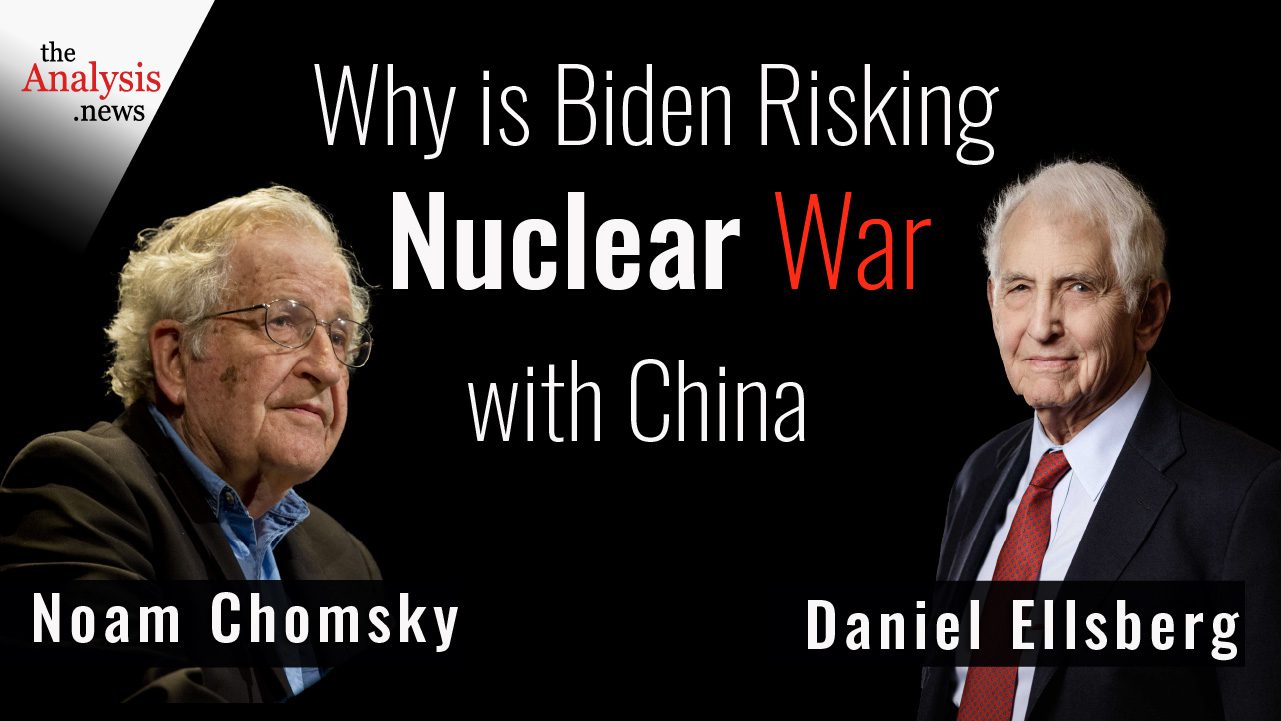
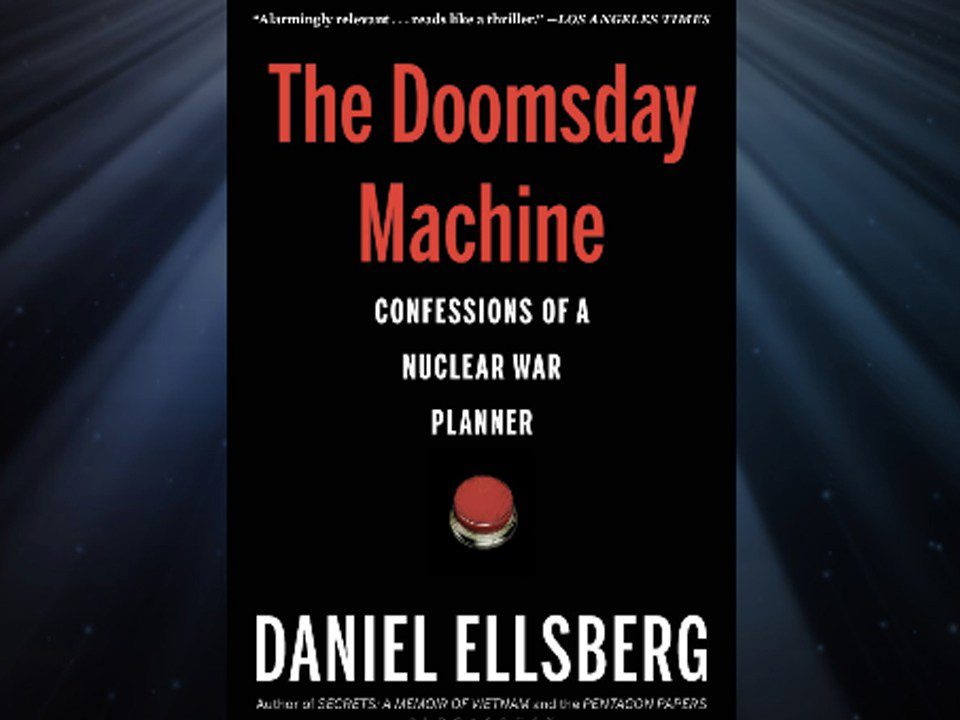


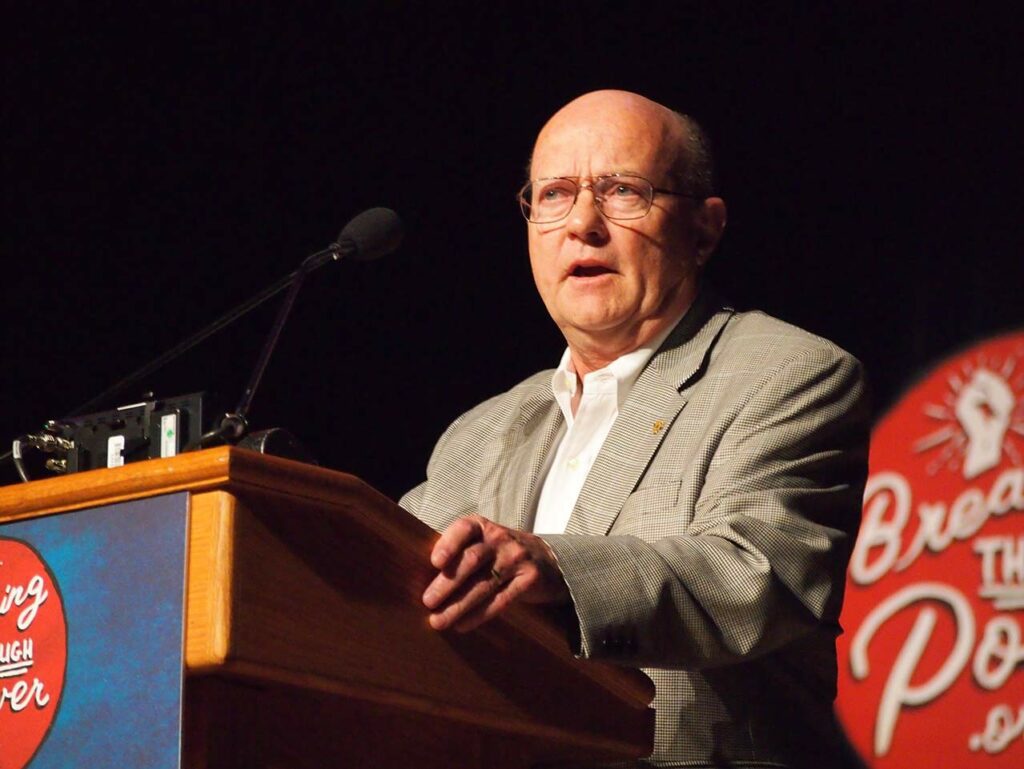
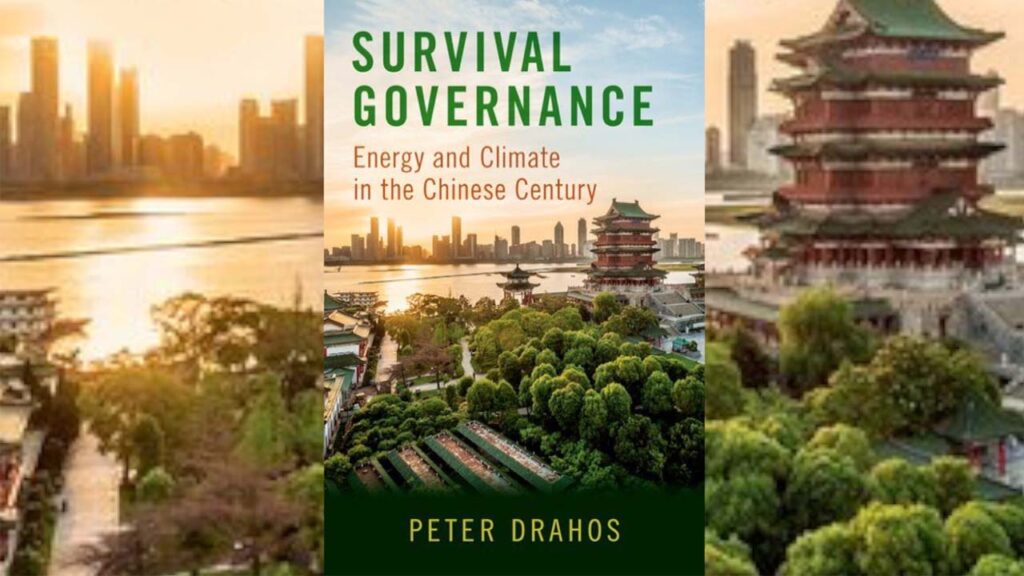


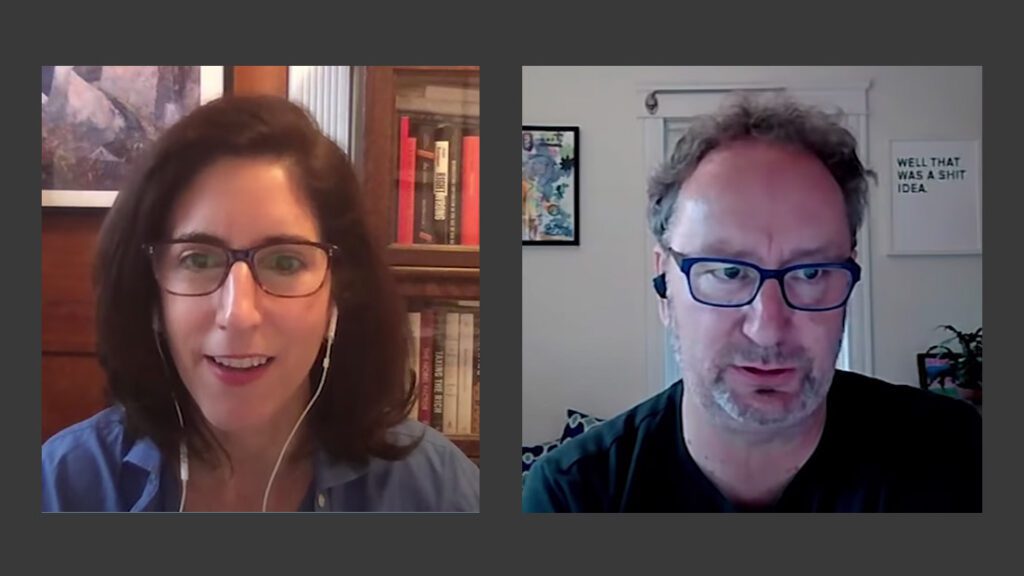



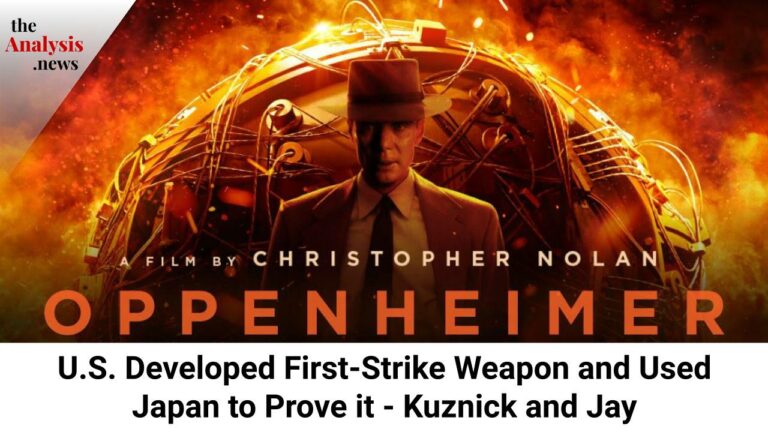



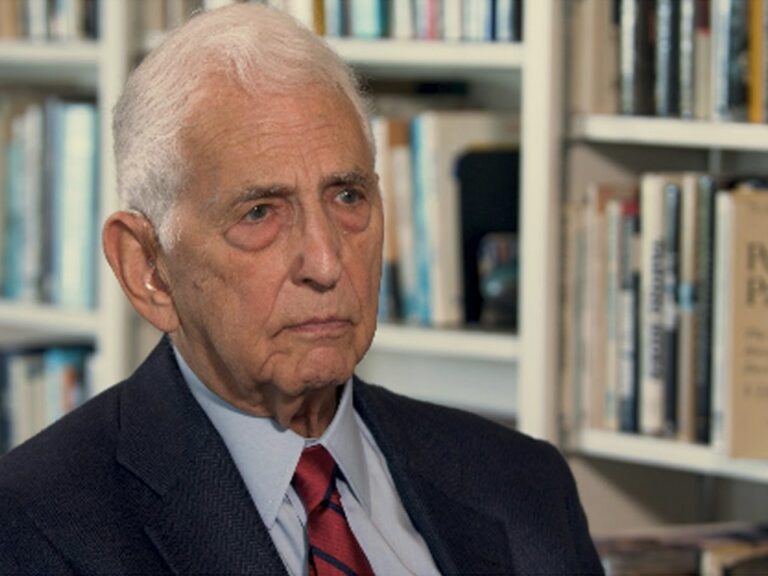
Great interview!
Your point about the Netherlands and semiconductors is actually understated, at least for the cutting edge silicon technology. The $150million lithography machines (these do the processing of silicon wafers to imprint the circuitry onto them) are not just made by ASML in the Netherlands (who are the “system integrators” of many components, such as the highly advanced light source from Carl Zeiss, and other tech using US held patents) but ASML also are contracted for the long term running of the machines. This means that the machines can’t even simply be captured to be used by anyone else. These machines are just one (very important) step of the process… other than the making of the silicon wafers, they after need to be cut up, put into their cases, have contacts soldered/welded into place. Oh, and you can’t make many chips with just one of these machines, it’s a slow process, so you need many. However, this is just for the cutting edge technology, for slightly older tech (>5yrs old) you still have many other options, but TSMC is incredibly important to global supply chains for products of all aspects of life, from mobile phones to cars… but yes, global capitalism isn’t rational… it’s educated by the newspapers!
Is there anyone left from “Desert Storm” who can command these LeMays to take up paintball before we all get nuked? Peace.
International law found against the CCP expansion in the south china sea, and fortification of islands close to the Philippines — of course the USA is not a part of that law of the sea, so well done USA you betrayed humanity again.
The fact that US politicians are self serving hypocrites should not distract from the creepy weirdness of the CCP dictator for life Xi Jinping, or the danger of letting a wanna be empire expand without check.
There are more than 23m people in Taiwan who have the right to self determination, and not be invaded as a thinly disguised distraction to prop up a bunch of sickos in Beijing.
and just save me from all these former hippies who now stand for International law when it serves then – yes I am talking about you Roger Waters.
…and holding the USA solely to blame (a right it normally richly deserves) is just silly.
The way to avoid Nuclear War is not to cave in to tinpot dictators. The ONLY way to avoid Nuclear War is to get rid of the bloody things.
How ? pretty simple
create a united nations of nuclear free states who meet some standard… NO Nukes !
add massive tariffs to any thing nuclear armed states want
ban exchange of technology
open source all the main tech giants
set up a free trade and movement of people between these states.
BAN all trade from rogue nations
finally the unasked question here is Why is Xi risking nuclear war with the USA ? he must know how flakey the place is.
and for the last time — well may we say god save the Queen, because nothing will save us from Xi jinping
It’s interesting to see how everyone is scratching their heads over the reasons why the West is pursuing this course. I also have been scratching my head over it because it seems to be lacking any sense….
However, you speak of semiconductors….. I believe one of the reasons for this war is not the now, but rather what the future “might hold” because these semiconductors are a necessity for AI and we are in a race towards AI and AI has the capacity to outdo any opponent in a very rapid pace by a milles league distance.
It is as Mr. Putin said, “He who controls AI, controls the world”.
We are currently trying to block Russia’s acces to semiconductors and by “owning” Taiwan, we can limit access to China…
Another reason I believe also has to do with the future, namely the most probable and likely drop in food resources (which we already see happening) due to climate change. By escalating Ukraine The West can achieve more control over food supplies world wide due to a large number of effects..
How can China “invade” Taiwan if it’s part of China? That’s like the US invading Kansas City.
And the government’s new favorite word is “unprovoked.”
Because Taiwan isn’t part of China. Yes, some documents on some paper in other jurisdictions may say it is, but economically, politically, militarily, culturally, and geographically… basically, in every real way, it is it’s own, separate country, whose security is dependant on it NOT being used as a tool to threaten China with.